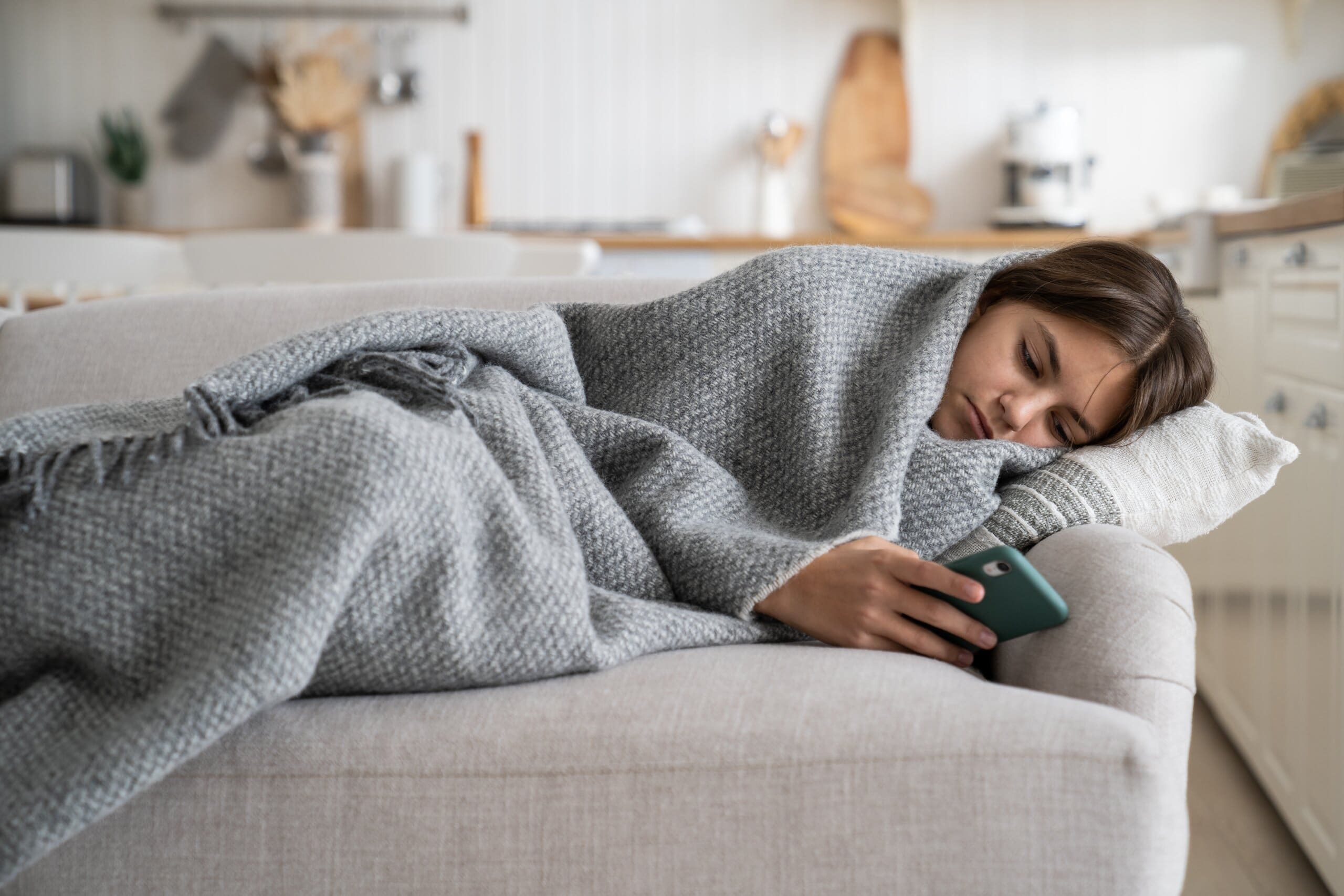Good news - you no longer need to feel guilty about staying in bed all day, scrolling on your phone for hours as you forget the shower or healthy eating. Turns out, rotting in bed all day is cool now… in fact, the trend has almost 300 million views on TikTok!
Forget ‘duvet day’, Gen-Z have coined the term ‘bed rotting’ as the latest self-care trend - and while it’s potentially rooted in symptoms of depression, there’s no longer any shame in rotting in bed for the day.
What exactly is bed rotting?
VICE dubbed 2022 ‘the year of rot’, with memes about rotting in our rooms becoming hugely popular during the winter months, where SAD (Seasonal Affective Disorder) got many of us hibernating under the covers.
However, it seems that this trend of ‘rotting’ has followed us well into 2023, with TikTokers coming together to admit their love for simply staying in bed, watching TV with some little snacks all day long. User @lilnitwits sums it up pretty nicely in her video, using the hashtags #ilovemybed and #hategoingout alongside #inbedrotting.
Anti-aesthetic aesthetic - but less gross than goblin mode
An ‘anti-aesthetic aesthetic’, this trend is the opposite of the ‘clean girl aesthetic’ you might’ve seen - think no makeup-makeup, healthy eating, unchipped nails… definitely not this variation of ‘goblin mode’. In fact, #goblinmode goes hand in hand with this trend, except bed rotting has roots in self-care, rather than giving up and going a bit feral (we see you, empty pizza box hoarders).
Instead, bed rotting is a bit more hygienic. Cuddle up in bed with your dressing gown, rub your feet together like a cricket and spend the whole day watching true crime videos on YouTube - just for the day you can pretend you have zero responsibilities and let your brain and body reset. It’s like a sick day, except you’re not sick!
Admittedly, the concept of ‘rotting in bed’ originally related to depressive episodes, with one of the key symptoms of depression being excessive sleeping and not leaving your bed. However, with mental health so readily spoken about on TikTok, it’s no wonder users have banded together to admit their secret adoration for just staying in bed, rather than doing ‘traditional’ self-care activities.
In fact, some users have even noted the benefits of ‘rotting in bed’, saying it could actually improve your mental health. We know this sounds counterproductive, but there might be some truth to it.

Can bed rotting improve your mental health?
The rise of this trend has arguably made it easier for people to talk about mental health struggles. Before this trend, it would’ve been difficult to admit you’ve spent all day in bed, especially as Hailey Bieber and Zoe Kravitz dominate the clean girls of the internet.
Gen-Z certainly haven’t shied away from discussing the nitty gritty of their mental health struggles on TikTok, creating a community of ‘bed rotting girlies’ (which transcends gender, by the way) giving each other bed rotting advice to stay healthy with it, like making yourself a drink to stay hydrated at the very least. @carlhutjrs, for example, made a video speaking 'from one after work bed-rotting girlie to another', advising others to wash their face and brush their teeth before heading back to bed.
Sometimes you just need a day in bed - we can all agree on that. But for those that suffer with anxiety, autism and sensory processing disorders, or general burnout, sometimes ‘duvet day’ doesn’t quite grasp the concept of what you need. You want to metaphorically rot. You want to give up for a little while and let your body rest. And thankfully, therapists and sleep experts agree that this is not such a bad thing.
Martin Seeley, CEO and Senior Sleep Expert at MattressNextDay, says:
Spending a day in bed can actually help to ease immediate symptoms of depression and anxiety. Having a space where you feel safe and secure away from the pressures of social situations, work or studying is fine and actually beneficial every once in a while.
Just make sure this doesn’t turn into avoidant behaviour, where you end up becoming reclusive from society or calling in sick to work to stay in bed instead. Everyone needs a ‘mental health day’ every now and then, but if you think your mental health is deteriorating, don’t fall into a rut of staying in bed all the time.
Exacerbating your depression symptoms will not improve your mental health, but continuing to push on every day when even getting dressed in the morning feels like a struggle is just going to lead to burnout - so bed rotting can help you recuperate. The issue is when you end up staying in bed for days or weeks at a time, at which point you should speak to a mental health professional about your mood and lifestyle.

The downsides of ‘rotting’ in bed
It is important to remember that Gen-Z love to make dark jokes, especially when it comes to their own mental health, and there are arguably two sides to this trend.
On one hand, you’ve got the ‘hot girl rotting’ (again, transcending gender) side, who just want to have a lazy time and reject that clean girl aesthetic. A long week at work? A hungover Sunday? It’s time for a day of rotting in bed.
But then on the other hand are the TikTokers who use bed rotting as an escape from the real world. Whether that’s because of mental health issues, or it’s going that way, their videos have a darker theme.
Using self-care as a justification for what are clearly symptoms of depression isn’t going to get you the help you need, even if you do it in a lighthearted way.
Martin explains:
You really shouldn’t think of bed rotting as a ‘hobby’ like a lot of TikTok users have suggested it is. It should instead be seen as a positive self-care tactic that’s used minimally and only when necessary as a means of recuperation and rest. Failing to understand the concept of bed rot is unfortunately going to lead to a worsening of mental health.
What can you do instead of ‘rotting in bed’?
Whether you’re worried you’re falling down a ‘rotting era’ rabbit hole, or really don’t think a bed rot day would benefit your mental health personally, there are other low energy activities that you can do.
The important thing is to not expect too much of yourself when you’re feeling down, overwhelmed or burnt out - if rotting in bed is the bottom of the scale in terms of energy, stick around that level.
3 ways to stop rotting away at home
- Have a bath
Do you need to exert any energy to lay in a bath? No! It’s essentially the same as laying in bed, except you’re cleansing your body and relaxing in a healthier way at the same time.
In fact, our post on How to Practise Self-Care in Your Sleep Routine notes a bubble bath as an ideal way to calm your mind. You’ll also feel better about yourself if you’re physically clean, plus adding some drops of lavender oil will help to calm your entire body - this is especially helpful if you’re feeling anxious.
- Go downstairs
This might seem simple, but even walking to the kitchen to grab a drink or a snack is going to make you feel better than staying wrapped up in your duvet all day. Sitting on the sofa instead is a great first step for overcoming bed rot, as you’ll be in a different environment.
You might also bump into a family member or housemate, and while that might initially seem annoying when you’re feeling avoidant, interacting with others is a surefire way to ease stress levels and feel less alone, which would worsen feelings of depression.
- Sit in the garden
Spending time in nature has been proven to improve feelings of depression and low mood. While sitting in your garden isn’t the same as a long country walk, it is a brilliant first step to combatting the urge to stay in bed all day.
An exposure to sunlight increases the brain’s production of serotonin, boosting your mood and helping you feel calm. Even if you continue to scroll on your phone while in the garden, you’ll still feel better than you would if you’d stayed in your bedroom.

How to ‘rot in bed’ more healthily
If you really don’t think you can manage any of the above suggestions, and simply want to roll over and snuggle up in your duvet, you should at least make sure to stay hydrated and eat something. As long as you’re not choosing to stay in bed as a means of ‘enabling’ any mental health issues, you can grab a snack, switch the telly on and ‘rot’ to your heart’s content.
As mentioned before, it’s vital you keep track of how many ‘rotting in bed’ days you have, and if you’re beginning to notice a pattern, it may be a sign of a mental health issue. Read our post on the connection between sleep and mental health for more information and advice.
There’s nothing wrong with having a day to yourself, living your best life scrolling TikTok in bed, but do be aware that it’s recommended to keep activities like eating, studying or working outside of the bedroom, so that your brain can associate your bed with sleep, rather than stimulation or anything else.
Plus, don't feel bad for wanting to stay in bed all day either. Teenagers actually need more sleep than adults, as their bodies are developing quickly and need time to recover. So, if you're between 13 and 18, it's likely you're quite sleepy anyway.
Martin Seeley, our Senior Sleep Expert and the CEO of MattressNextDay, warns against the dangers of bed rotting
It’s important to take time to reset your mind and body - self-care should be an essential part of your lifestyle, and a simple ‘duvet day’ can drastically improve your mood. However, Martin Seeley has three major warnings against the bed rotting trend:
1. Don’t let it become your lifestyle, and be wary of your mental health
Martin explains that despite a simple day of rest and recuperation being key for proper self-care, it’s very easy to fall into the habit of staying in bed, especially if you’re prone to mental illness. He explains:
If you tend to suffer from symptoms of depression or low mood, such as not wanting to get up in the morning, it’s easy to see the bed rotting trend as the perfect excuse to stay in bed.
While for lots of people a bed rot day can do wonders for their mental health, it can seriously worsen the health of those with depression and anxiety. Oversleeping is a key indicator of your mental health deteriorating, and it’s easy to see a trend like this and fall victim to it. Don’t attempt to warrant more than one day at a time in bed, or if you like to ‘rot in bed’ when you get home from work or school, try to only do this every other day, keeping yourself busy and mind stimulated in between. If you find yourself in a habit of rotting in bed, you’ll easily end up ignoring your responsibilities.
The main thing to remember is to try not to sleep throughout your ‘bed rot day’ - it’s fine to stay in bed if you need to, but try to stay awake and somewhat stimulated. Even if you’re just watching TV or on your phone, keep yourself awake. Make sure your reasoning for rotting in bed is healthy, rather than a way to justify symptoms of depression.
2. Steer clear from napping - you’ll seriously mess with your sleeping pattern
If you do nap throughout your bed rot day, keep in mind that this will mess with your circadian rhythm, Martin says:
Our circadian rhythm (our internal body clock) works by responding to light changes in our environment. If you’re spending the day in bed - a place your brain associates with sleep - while daylight peaks through the curtains, your body clock will be muddled.
Equally, if you nap during your day in bed, you’ll not only end up feeling more tired than you did before, but you’ll struggle to sleep come nighttime, disrupting your sleeping pattern.
Your body releases the sleep hormone, melatonin, during the night when it detects there’s no more sunlight. If you try to sleep during the day, your body won’t be releasing melatonin, making it difficult to fall into a deep sleep. Instead, you’ll enter a light sleep phase and eventually be woken out of it, so your body won’t have gained anything from the nap. Come the evening, however, your body clock will be disordered, and you’ll struggle to fall into a deep sleep then, too.
3. Rot with your friends to make sure you don’t become disconnected
While you might initially go into your bed rotting day as a means to disconnect from the real world for a while, continuously choosing to not socialise will damage not only your mental health, but your lifestyle and sense of self-worth. Martin explains:
It’s completely normal to want to take a break from socialising every once in a while, but remember that humans are social creatures who need social interaction to stay happy and healthy.
Don’t fall into a trap of glamorising isolation, and be careful you don’t turn bed rotting into avoidant behaviour that disconnects you from the world. Thankfully, bed rotting is something you can do with your friends. Take your pyjamas to your best mate’s house and jump into bed - watch a film together, send each other TikToks or do some traditional self-care, like face masks.
You’ll both feel the benefits of bed rotting with no social pressure from outside, but you’ll have still interacted with each other.




